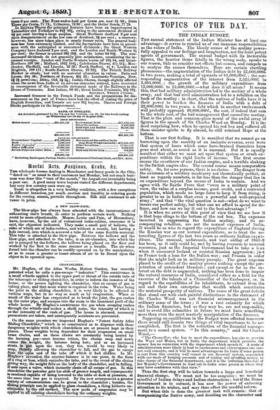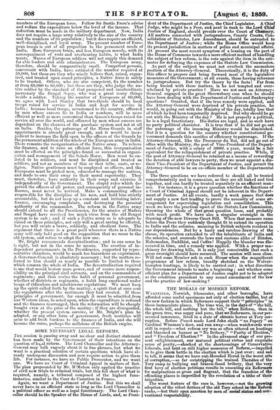TOPICS OF THE DAY.
THE INDIAN BUDGET.
•
Tim annual statement of the Indian Minister has at least one advantage--it serves to remind us of our immense responsibilities as the rulers of India. The bloody scenes of the mutiny power- fully appealed to our feelings and imagination, not the least potent agents of government. The annual budget with its inexorable figures, the heavier items fatally in the wrong scale, speaks to our reason, bid's us consider not effects but causes, and compels us to analyze the causes themselves. Here are certain startling phenomena—the augmentation of the Indian debt by 22,000,000k in two years, making a total of upwards of 81,000,0001. ; the cor- responding augmentation of the interest from 2,525,000/. to 3,564,0001. ; the growth of the military expenditure from 12,000,0001. to 25,000,0001.—what does it all mean.? It means this, that bad military administration led to the mutiny of a whole army, and that bad civil administration led to a rebellion on the back of the mutiny ; in short, that the natives of India have it in their power to burden the finances of India with a debt of 22,000,0001. in two years, a debt which in another twelvemonth will probably approach 40,000,0001, the cost, if indeed that sum be the whole cost, of the bad management that caused the mutiny. That is the plain and common-place moral of the awful array of figures in the speech of Sir Charles Wood on Monday. It is in,- deed surprising how, when he opened his red box and suffered all these sinister spirits to fly abroad, he still retained Hope at the. bottom.
That is our first feeling. It is manifest that we cannot go on borrowing upon the security of an inelastic revenue, even were that system of loans which some hare-brained financiers have gone mad about, as sound as it is unsound. But it is equally manifest that either we must act upon that system or crash ex- penditure within the rigid limits of income. The first course means the overthrow of our Indian empire, and a terrible shaking to the British empire also. The second course means comparative safety. from
the for sane persons, there is no choice. The danger the existence of a military machinery not theoretically perfect, at least as regards numbers, is far less than the danger that lies in an expenditure beyond the means of India to sustain. And we agree with Sir Bartle Frere that "even in a military point of view, the value of a surplus income, good credit, and a contented
i population, which needs no large force to keep it from rising, is greater to us in India than even a powerful and well-prepared army ;" and that " the vital question is not—what do we want to insure our perfect safety, but what can we afford to spend for de- fenee,, and how can we lay it out to the best advantage ? "
It is when we arrive at this point of view that we see how it is that hope clings to the bottom of the red box. The expenses incurred in. suppressing the Indian mutiny, and its ac- companying rebellion, are not the normal expenses of India. It would be as wise to regard the expenditure of England during the Russian war as our normal expenditure, as to treat the as- tounding figures of the last two years as ordinary Indian exi on- diture. The unusual, unforeseen' and vast outlay of 1857-9 has been, as it only could be, met by having recourse to unusual resources) just as the Imperial Government had to take a ]can when it succoured Ireland or resisted Russian aggression; juit as France took a loan for the Italian war ; and Prussia in order that she might Took on in military panoply. The great expense placed to the credit of the mutiny proves nothing except the per- petration of antecedent blunders ; and except so far as the in- terest on the debt is augmented, nothing has been done to impair the natural resources of India, considered either as a field for the exercise of the talents of a elaneellor of the Exchequer, or, in regard to the capabilities of its inhabitants, to extract from the soil and their own enterprise that wealth which constitutes the material prosperity of nations. The cause of the great deficits that stand out with such painful distinctness in the statement of Sir Charles Wood was not financial mismanagement in the
ordinary sense of the terms ; it was a vast calamity for which the Indian financiers, bad as they may be, are not responsible, and to avoid like calamities in future we must have something more than even the most masterly manipulation of the finances. Supposing an equilibrium in the Budget were effected tomorrow there would still remain two things of vital importance to be ac- complished. The first is the reduction of the financial manage- ment to a sound system. " In this country," said Sir Charles Wood,-- " The Chancellor, who has to meet the expenditure, has also to provide
the Ways and Means, but in India the department which provides the money has no connexion with the department which spends it. A mode of administration more likely to lead to carelessness and extravagance one can- not well conceive, and it will be most advantageous for India if sonic person is sent from this country well versed in our financial system, acquainted with our mode of keeping accounts and of raising and spending money, to take charge of the financial department, and it is the intention therefore of her Majesty's Government to send out to India some person in whom they may have confidence with that view."
Thus the first step will be taken towards a large and beneficial financial change. We must not be too sanguine ; we must be mindful of Indian delays and Indian obstructions ; but if the Home Government is in earnest, it has now the power of enforcing attention to its wishes, and may thus effect the needful reform.
But when this is done the greatest task will remain: that of reorganizing the Native army, and deciding on the character and numbers of the European force. Follow Sir Bartle Frere's advice and reduce the expenditure below the level of the income. That reduction must be made in the military department. Now, India does not require a large army relatively to the size of the country and the numbers of its population ; but it does require an efficient, well-disciplined, and loyal army. The present number of Euro- pean troops is out of all proportion to the permanent needs of India. More European brain, and less European muscle, with its
accompaniment of rude and overbearing habits, is what India wants. Masses of European soldiers will not supply this demand for able leaders and able administrators. The European army, therefore, should be comparatively small. Competent persons, conversant with India, have estimated the number required at 50,000, but these are they who wisely believe that, raised, organ- ized, and treated upon sound principles, a Native force is safely to be trusted.' Others, who are also competent, fix the number at from 60,000 to 80,000 ; but these are they, who judge the na- tive soldier by the standard of that pampered and insubordinate mercenary the Bengal Sepoy, who was a great many things beside a soldier. Taking the number of Europeans at 60,000, we agree with Lord Stanley that two-thirds should be local troops raised for service in India and kept for service in India ; because local troops, accustomed to the country, officered by men whose careers lie in India or nowhere, will be more efficient as well as more economical than Queen's troops raised for service all over the world, and officered by men whose careers are dependent on the chances of the purchase system and not at all on India. Besides, the patronage of the Horse Guards in staff appointments is already great enough, and it would be inex- pedient to increase the field open to the officers of the Guards by the permanent addition of the whole of the European army in India. There remains the reorganization of the Native army. To relieve the finances, and to raise an efficient force, this reorganization 'must be effected on the principles found so successful in organi- zation and management of the Scinde Horse. Men must be en- listed to be soldiers, and must be disciplined and treated as soldiers, and not as members of this or that tribe, caste, or re- ligion. Native gentlemen must be employed as officers, and the Europeans must be picked men, educated .to manage the natives, and made to owe their sway to their moral superiority. They must, therefore, have authority in their corps and exercise it independently of the Government. The stupid rules which de- prived the officers of all power, and consequently of personal in- fluence, must never be revived. Make a commanding officer responsible for the discipline of his men, and hold him strictly accountable, but do not keep up a constant and irritating inter- ference, encouraging complaints, and destroying the personal authority of the commander. The reform in the Native army should extend to all the Presidencies, for the armies of Madras and Bengal have received too much virus from the old Bengal system to be safe ; and if such a Native army as is adequate be raised on these principles, not only will a great saving be effected, but you will create a brave, soldierly, and obedient force. The argument that there is a great peril wherever there is a Native army will only hold good on the supposition that we recur to the old system, and refuse to adopt the new one.
Mr. Bright recommends decentralization ; and in one sense he is right, but not in the sense he means. The erection of in- dependent governments in the Presidencies, supported by repre- sentative chambers, would be much too hazardous an experiment. A Governor-General is absolutely necessary ; but the matters re- ferred to him should as nearly as possible be limited to those which concern the whole of India. The decentralization required is one that would bestow more power, and of course more respon- sibility on the principal civil servants, and on the commanders of regiments ; and thus revive the habit of personal government, whether of districts or regiments, a habit long smothered under 'heaps of ridiculous and mischievous regulations. We must keep up the spirit called forth by the mutiny, a spirit that at once sent the regulations after the mutineers they had created. If these principles of government, far enough it must be admitted from our Western ideas, be acted upon, when the expenditure is reduced and the finances rearranged, then the reformation will be cheaply bought even at the price of the mutiny; if they are disregarded, whether the present system survive, or Mr. Bright's plan be adopted, or any other form of government, fresh mutinies will arise to add fresh burdens to the finances of India, and she will become the curse, perhaps the millstone of the British empire.



























 Previous page
Previous page